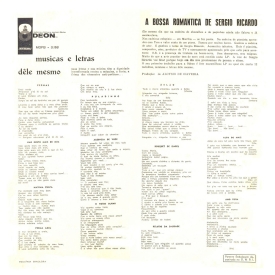- Ribamar — Palmas Para Ribamar e Seu Piano
(1960) Philips P 630.431 L - Noite Ilustrada — Noite Ilustrada
(1969) Continental PPL 12391 - Lúcio Alves — Cantando Depois do Sol
(1960) Philips P 630.440 L - Sérgio Ricardo — Não Gosto Mais de Mim – A Bossa Romântica de Sérgio Ricardo
(1960) Odeon MOFB 3168

This double-page spread from the book features Ribamar and his most successful composition.
Composer, accordionist and pianist José Ribamar Pereira da Silva (1919–1987) started his professional career in 1950 as accompanist for singer Dolores Duran, with whom he also wrote a number of songs which soon became standards, such as Pela Rua, Quem Foi, Se Eu Tiver and Idéias Erradas.
In 1952, while he was supporting several acts including Fafá Lemos, his bolero Duas Vidas, sung by Fernando Barreto, became his first success as a composer. In the mid-fifties, his appearances with singer Tito Madi made both a very popular duo in the night club circuit of Rio de Janeiro.
Pela Rua was the first of his collaborations with Dolores Duran as composer and lyricist. The song, introduced by Alaíde Costa in 1959, had one of its most memorable recordings by Elizeth Cardoso on her 1960 album A Meiga Elizeth.
In 1959, when Dolores Duran died at the age of only 29, her friend Marisa Gata Mansa gave an unfinished poem of Duran to Ribamar in order to compose a song in remembrance of her. The result was the wonderful Ternura Antiga, introduced with a highly emotional interpretation by Lucienne Franco at the 1960 Festival das Dez Mais Lindas Canções de Amor at TV Rio. Ternura Antiga became Ribamars most successful composition, recorded more than 70 times by artists like Paulo Alencar, Nelson Gonçalves, Roberto Audi and Elza Laranjeira.
Ribamar recorded nine albums from 1956 to 1976 including Carinho e Amor (1960) with singer Tito Madi and Ribamar & Zito Righi (1963) with saxophonist Zito Righi.
Playlist Ternura Antiga:
1. Lucienne Franco from the album Festival das Dez Mais Lindas Canções de Amor (1960)
2. Tito Madi from the album Romance (1961)
3. Marisa Gata Mansa from the album Little Club Apresenta Marisa (1962)
Playlist Ribamar:
1. Pela Rua (Ribamar – Dolores Duran) from the album Ribamar Interpreta Dolores Duran (1969)
2. Idéias Erradas (Ribamar – Dolores Duran) from the album Palmas Para Ribamar (1960)
3. Duas Vidas (Ribamar – Esdras Pereira da Silva) from the album Dançando com Ribamar e Seu Conjunto (1956)
4. Onde Estava Eu (Armando Cavalcanti – Victor Freire) from the album Ribamar & Zito Righi (1963) with Zito Righi
5. Carinho e Amor (Tito Madi) from the album Carinho e Amor (1960) with Tito Madi
The beautiful art work for Palmas Para Ribamar, with the artist’s delicate pose and the elaborated typeset, is uncredited.
Lúcio Alves is featured in → No. 40 — Pages 50-51, yet the uncredited artwork for Cantando Depois do Sol has to be presented here in full size for its striking beauty.










wonderfully informative and nicely presented as always. Bravo
Thanks, I appreciate it. What about Dizzy and Lalo?
AD